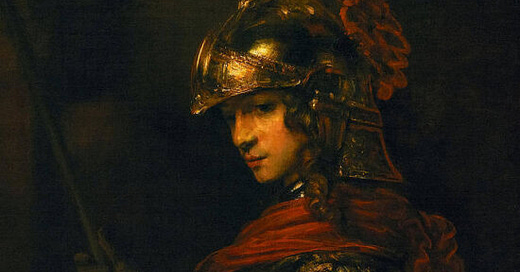Oresteia 3.7: The final verdict by Athena
Summary 15 # Man, God, and Society in Western Literature - From Gods to God and Back
During the final debate between the Furies and the Olympian god Apollo, the Furies lament:
"O son of Zeus, you are cunning, Apollo.
As a young god, you have thwarted ancient demons,
Out of respect for that supplicant, a godless man,
merciless toward his parents.
Cunningly, you, a god, have saved the matricide.
What justice is there in that, one might say."
Thus, they feel insulted as "ancient" beings by the "young god." In response, Apollo declares:
"Out, I say to you, disappear from this house, and quickly,
leave the sacred hall of the oracle. (...)
You should not linger near this house, but where heads are severed,
eyes are gouged out,
with judgments and slaughter, where seed is destroyed,
the bloom of boys violated, where there is mutilation, stoning,
and endless pitiful groaning from men, impaled on stakes.
Do you hear what kind of celebration, abhorred by the gods, you favor? (...)
No god wants anything to do with such a herd."
Apollo frames the Furies here as primitive beings incapable of seeing the light of reason. The Furies defend their ancient office:
"We drive matricides out of their homes."
To which Apollo quickly retorts:
"And what if that mother has killed her husband?"
The Furies respond resolutely:
"That would not be the murder of a blood relative."
Thus, the fundamental conflict between the two groups of gods comes sharply to the fore when Apollo reacts:
"So, you dismiss Zeus' and Hera's vows of loyalty as utterly worthless and meaningless.
With such a statement, love is contemptuously rejected, upon which humanity nevertheless depends for its closest bonds, for the marriage bed, destined for man and woman, is stronger than an oath and is protected by justice."
Blood vengeance versus universal justice. Apollo finds it irrational that one person is punished while another murderer goes free in the eyes of the Furies. Apollo sees only one solution:
"The goddess Athena will see to it that justice is done here."
During this trial, Apollo claims that his work is based op the impartial reason rooted in Zeus:
"Never have I spoken from my oracle seat—neither about a man, a woman, nor a land—what was not commanded by Zeus, the Father of the Olympians. So consider how strong that justice is here, and follow my father's will, I tell you. No oath can ever have more power than that of Zeus."
In other words, the position of the new gods is that when blood has been shed, it does not matter in what context the murder took place; it must be condemned. However, the Furies place no value on argumentation and rationality. They act based on strong feelings of revenge. These feelings, according to them, are so ancient that without them, cultures would not be held together.
Although Homerus does not speak of the Furies, the aspect they represent—family vengeance—does appear in the work. Specifically, there is the vengeance Poseidon takes on Odysseus for blinding his son, the Cyclops Polyphemus. Unlike in the Oresteia, the Homeric world shows greater tolerance for these primal forces. The other gods try to assist Odysseus when Poseidon is in Ethiopia, yet they do not condemn him.
Athena begins the trial in the Oresteia by emphasizing her strength: she knows where Zeus’s lightning bolts are kept. However, she doesn’t need them, for she possesses the power of persuasion. She can empathize with the other side and present matters in a way that allows the other side to understand them.
"Now that I see this strange company in my land, I do not fear, but my gaze is filled with wonder. Who are you? I ask you all at once.”
These words convey a great openness, in stark contrast to Apollo’s condemnation of the Furies. Just as in the Odyssey, she remains open to all worlds and ways of life.
Yet, unlike in that work, she does not want to let the world of Apollo and that of the Furies exist separately; she wants to unite them. She seeks a synthesis so they can continue in a higher, shared form. In this endeavor, a tendency toward monotheism can be seen: the formation of a dominant force within Athenian culture. After listening to each party’s plea, Athena herself finds herself in conflict, saying,
“This matter is too difficult for a human being to believe that he can pass judgment here. I, too, am unable to deliver a verdict when it comes to murder committed in fierce revenge.”
She sees only one solution: the establishment of a court of law, in which twelve Athenian citizens are to sit on the jury. But the citizens are also divided in their vote: six to six. Therefore, it still falls to Athena, as the presiding judge, to cast the deciding vote:
“Now it is my task to deliver the final judgment. I cast this vote for Orestes.”
The reasoning she gives was, for Dreyfus, nearly enough reason to stop teaching the book altogether. Athena says,
“No mother gave me life. I wholeheartedly approve of all that is male, apart from marriage, and as my father’s child, I stand strong for the father. Thus, I do not weigh the death of a woman more heavily, now that she has murdered the man who guards the household. Orestes wins, even if the votes are tied in the verdict.”




